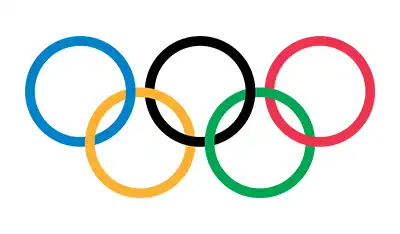
The Olympic Games have a rich and ancient history that dates back to ancient Greece. The modern Olympic Games, or Olympics, are the leading international sports events divided in summer and winter sports. Athletes from all over the world gather to participate in various sports competitions.
Ancient Olympic Games
The ancient Olympic Games originated in Olympia, Greece. They were held every four years in honor of the Greek god Zeus. The games were part of a religious festival and included athletic competitions like running, wrestling, boxing and chariot racing. Only freeborn men were allowed to participate. Women were not allowed even to attend the games.
The games continued for several centuries, even during the Roman Empire. However, in 393 CE, the Roman Emperor Theodosius I banned all pagan festivals, including the Olympic Games.
Revival of the Olympic Games

The idea of reviving the Olympic Games was proposed by Pierre de Coubertin, a French educator, in the late 1800s. His efforts led to the formation of the IOC, the International Olympic Committee in 1894. The first modern Olympic Games were held in Athens, Greece, in 1896, gathering 241 athletes from 14 countries. They competed in 43 events.
After that, the Olympic games continued to grow and evolve, being held every four years. The games were only canceled during World War I and World War II.


Winter Olympic Games
In 1924, the first Winter games were held in Chamonix, France. Initially called “International Winter Sports Week” and it was a big success. More than 250 athletes from 16 nations competed in 16 events. The IOC then decided to create the Winter Olympics, that would occur in the same year as the Summer Olympics, but in the Winter. The 1924 Chamonix games were then retroactively designated as the first Winter Olympics.
In 1986 IOC officials voted to alter the schedule of the Olympic games. From then on, the Summer and Olympic games would happen every 2 years, alternately. For this reason, the 1992 Winter games were the last to be held in the same year as the Summer games. And that’s also why the following Winter Games happened only two years after the 1992 event.
Paralympic Games
In 1948, Sir Ludwig Guttmann organized a multi-sport event between several hospitals to coincide with the 1948 London Olympics. He was determined to promote the rehabilitation of soldiers after World War II. It was originally know as the Stoke Mandeville Games. The event became an annual sports festival over the next 12 years.
In 1960, Guttmann brought 400 athletes to Rome to compete in the “Parallel Olympics”, which ran at the same time as the Summer Olympics. It became to be known as the first Paralympics. The first time the Olympic and Paralympic games were held in the same city was in 1988, in Seoul, South Korea. The IOC and the IPC (International Paralympic Commitee) signed an agreement in 2001 so that the host cities would manage both Olympic and Paralympic games. This has been happening since the 2008 Beijing Summer Games.
The Olympic Games have seen various challenges, controversies, and moments of triumph throughout their long history, but they continue to be a symbol of international cooperation and athletic excellence.
Olympic Games history: host cities
Summer Games
- 1896 – Athens, Greece
- 1900 – Paris, France
- 1904 – St. Louis, USA
- 1908 – London, United Kingdom
- 1912 – Stockholm, Sweden
- 1916 – Berlin, Germany – canceled due to WWI
- 1920 – Antwerp, Belgium
- 1924 – Paris, France
- 1928 – Amsterdam, Netherlands
- 1932 – Los Angeles, USA
- 1936 – Berlin, Germany
- 1940 – Tokyo, Japan – canceled due to WWII
- 1944 – London, United Kingdom – canceled due to WWII
- 1948 – London, United Kingdom
- 1952 – Helsinki, Finland
- 1956 – Melbourne, Australia
- 1960 – Rome, Italy
- 1964 – Tokyo, Japan
- 1968 – Mexico City, Mexico
- 1972 – Munich, Germany
- 1976 – Montreal, Canada
- 1980 – Moscow, Soviet Union
- 1984 – Los Angeles, USA
- 1988 – Seoul, South Korea
- 1992 – Barcelona, Spain
- 1996 – Atlanta, USA
- 2000 – Sydney, Australia
- 2004 – Athens, Greece
- 2008 – Beijing, China
- 2012 – London, United Kingdom
- 2016 – Rio de Janeiro, Brazil
- 2020 – Tokyo, Japan
- 2024 – Paris, France
- 2028 – Los Angeles, USA
- 2032 – Brisbane, Australia
Winter Games
- 1924 – Chamonix, France
- 1928 – St. Moritz, Switzerland
- 1932 – Lake Placid, USA
- 1936 – Garmisch-Partenkirchen, Germany
- 1940 – Sapporo, Japan – canceled due to WWII
- 1944 – Cortina d’Ampezzo, Italy – canceled due to WWII
- 1948 – St. Moritz, Switzerland
- 1952 – Oslo, Norway
- 1956 – Cortina d’Ampezzo – Italy
- 1960 – Squaw Valley, USA
- 1964 – Innsbruck, Austria
- 1968 – Grenoble, France
- 1972 – Sapporo, Japan
- 1976 – Innsbruck, Austria
- 1980 – Lake Placid, USA
- 1984 – Sarajevo, Yugoslavia
- 1988 – Calgary, Canada
- 1992 – Albertville, France
- 1994 – Lillehammer, Norway
- 1998 – Nagano, Japan
- 2002 – Salt Lake City, USA
- 2006 – Turin, Italy
- 2010 – Vancouver, Canada
- 2014 – Sochi, Russia
- 2018 – Pyeongchang, South Korea
- 2022 – Beijing, China
- 2026 – Milan and Cortina d’Ampezzo – Italy
